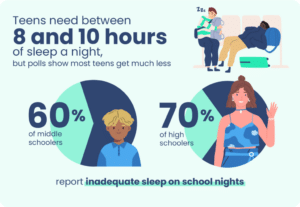Time For Bed-Avoiding Sleep Deprivation
Is your child getting enough sleep?
 A recent report reveals that an alarming number of children are grappling with sleep deprivation, which is taking a toll on their academic performance.
A recent report reveals that an alarming number of children are grappling with sleep deprivation, which is taking a toll on their academic performance.
Smartphones, computers, and TVs in bedrooms have been identified as contributing factors to poor sleep patterns in children.
A single restless night can lead to irritability and difficulty concentrating the following day. The consequences of consistently inadequate sleep can be even more profound.
But how much sleep do children really need?
Although individual needs may vary, children should ideally aim for the following recommended hours:
– Pre-schoolers: 11 to 13 hours per night
– 5 to 12-year-olds: 10 to 11 hours per night
– Teenagers: 9 hours per night
Sleep Deprivation
Sleep disturbances during childhood and adolescence are common and can show up in various forms, such as nightmares, sleep terrors, sleepwalking, and irregular sleep patterns.

While these issues can often be temporary with consistent reinforcement of good habits, some children and young people may find themselves stuck in unhelpful routines.
If sleep problems persist or become a regular issue, it’s important to seek help as soon as possible. Parents or carers should reach out to school nurses for advice, especially if sleep difficulties are deeply ingrained and causing distress to families and children. Families can also seek guidance from their GP for further assistance.
Here are five practical suggestions to help children better manage their screen time:
1. Establish clear rules: Set clear guidelines for when and how long children can use smartphones. Stick to a consistent schedule and ensure they understand the importance of adhering to it.
2. Encourage other activities: Introduce them to outdoor play, homework hour, reading, or arts and crafts. It’ll help them explore new interests and reduce their reliance on screens.
3. Use parental controls: Take advantage of parental control features to block inappropriate content and limit screen time. It’s an effective way to monitor their activities.
4. Lead by example: Set a positive example by reducing your own screen time. Engage in tech-free family activities and have face-to-face conversations.
5. Designate screen-free zones: Identify specific areas such as the dinner table or bedrooms where phones are off-limits. This will encourage more real-world interactions and foster better communication within the family.
I’ve personally witnessed the effects of sleep deprivation on primary school pupils. One of the boys in my class was struggling academically, constantly appearing tired and unable to focus. It later emerged that he had been watching TV late into the night without his parents’ knowledge. Once he started getting adequate sleep, he became a completely different child at school.
While most experts agree that having TVs, smartphones, and computers in bedrooms isn’t ideal, the reality is that many children do have their own devices. Therefore, it’s crucial for parents to understand how to strike a balance between screen time and a restful night’s sleep.



